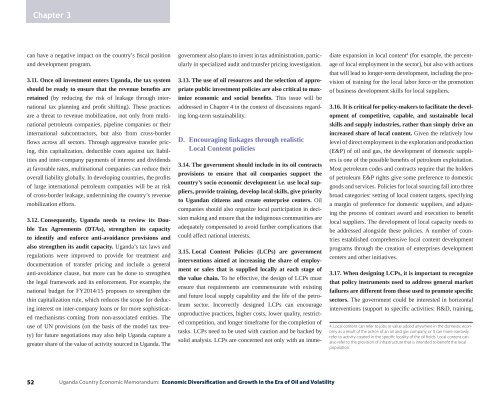Economic Diversification and Growth
71mK301zeG0
71mK301zeG0
Create successful ePaper yourself
Turn your PDF publications into a flip-book with our unique Google optimized e-Paper software.
Chapter 3<br />
can have a negative impact on the country’s fiscal position<br />
<strong>and</strong> development program.<br />
3.11. Once oil investment enters Ug<strong>and</strong>a, the tax system<br />
should be ready to ensure that the revenue benefits are<br />
retained (by reducing the risk of leakage through international<br />
tax planning <strong>and</strong> profit shifting). These practices<br />
are a threat to revenue mobilization, not only from multinational<br />
petroleum companies, pipeline companies or their<br />
international subcontractors, but also from cross-border<br />
flows across all sectors. Through aggressive transfer pricing,<br />
thin capitalization, deductible costs against tax liabilities<br />
<strong>and</strong> inter-company payments of interest <strong>and</strong> dividends<br />
at favorable rates, multinational companies can reduce their<br />
overall liability globally. In developing countries, the profits<br />
of large international petroleum companies will be at risk<br />
of cross-border leakage, undermining the country’s revenue<br />
mobilization efforts.<br />
3.12. Consequently, Ug<strong>and</strong>a needs to review its Double<br />
Tax Agreements (DTAs), strengthen its capacity<br />
to identify <strong>and</strong> enforce anti-avoidance provisions <strong>and</strong><br />
also strengthen its audit capacity. Ug<strong>and</strong>a’s tax laws <strong>and</strong><br />
regulations were improved to provide for treatment <strong>and</strong><br />
documentation of transfer pricing <strong>and</strong> include a general<br />
anti-avoidance clause, but more can be done to strengthen<br />
the legal framework <strong>and</strong> its enforcement. For example, the<br />
national budget for FY2014/15 proposes to strengthen the<br />
thin capitalization rule, which reduces the scope for deducing<br />
interest on inter-company loans or for more sophisticated<br />
mechanisms coming from non-associated entities. The<br />
use of UN provisions (on the basis of the model tax treaty)<br />
for future negotiations may also help Ug<strong>and</strong>a capture a<br />
greater share of the value of activity sourced in Ug<strong>and</strong>a. The<br />
government also plans to invest in tax administration, particularly<br />
in specialized audit <strong>and</strong> transfer pricing investigation.<br />
3.13. The use of oil resources <strong>and</strong> the selection of appropriate<br />
public investment policies are also critical to maximize<br />
economic <strong>and</strong> social benefits. This issue will be<br />
addressed in Chapter 4 in the context of discussions regarding<br />
long-term sustainability.<br />
D. Encouraging linkages through realistic<br />
Local Content policies<br />
3.14. The government should include in its oil contracts<br />
provisions to ensure that oil companies support the<br />
country’s socio economic development i.e. use local suppliers,<br />
provide training, develop local skills, give priority<br />
to Ug<strong>and</strong>an citizens <strong>and</strong> create enterprise centers. Oil<br />
companies should also organize local participation in decision<br />
making <strong>and</strong> ensure that the indigenous communities are<br />
adequately compensated to avoid further complications that<br />
could affect national interests.<br />
3.15. Local Content Policies (LCPs) are government<br />
interventions aimed at increasing the share of employment<br />
or sales that is supplied locally at each stage of<br />
the value chain. To be effective, the design of LCPs must<br />
ensure that requirements are commensurate with existing<br />
<strong>and</strong> future local supply capability <strong>and</strong> the life of the petroleum<br />
sector. Incorrectly designed LCPs can encourage<br />
unproductive practices, higher costs, lower quality, restricted<br />
competition, <strong>and</strong> longer timeframe for the completion of<br />
tasks. LCPs need to be used with caution <strong>and</strong> be backed by<br />
solid analysis. LCPs are concerned not only with an immediate<br />
expansion in local content 4 (for example, the percentage<br />
of local employment in the sector), but also with actions<br />
that will lead to longer-term development, including the provision<br />
of training for the local labor force or the promotion<br />
of business development skills for local suppliers.<br />
3.16. It is critical for policy-makers to facilitate the development<br />
of competitive, capable, <strong>and</strong> sustainable local<br />
skills <strong>and</strong> supply industries, rather than simply drive an<br />
increased share of local content. Given the relatively low<br />
level of direct employment in the exploration <strong>and</strong> production<br />
(E&P) of oil <strong>and</strong> gas, the development of domestic suppliers<br />
is one of the possible benefits of petroleum exploitation.<br />
Most petroleum codes <strong>and</strong> contracts require that the holders<br />
of petroleum E&P rights give some preference to domestic<br />
goods <strong>and</strong> services. Policies for local sourcing fall into three<br />
broad categories: setting of local content targets, specifying<br />
a margin of preference for domestic suppliers, <strong>and</strong> adjusting<br />
the process of contract award <strong>and</strong> execution to benefit<br />
local suppliers. The development of local capacity needs to<br />
be addressed alongside these policies. A number of countries<br />
established comprehensive local content development<br />
programs through the creation of enterprises development<br />
centers <strong>and</strong> other initiatives.<br />
3.17. When designing LCPs, it is important to recognize<br />
that policy instruments used to address general market<br />
failures are different from those used to promote specific<br />
sectors. The government could be interested in horizontal<br />
interventions (support to specific activities: R&D, training,<br />
4. Local content can refer to jobs or value added anywhere in the domestic economy<br />
as a result of the action of an oil <strong>and</strong> gas company, or it can more narrowly<br />
refer to activity created in the specific locality of the oil fields. Local content can<br />
also refer to the provision of infrastructure that is intended to benefit the local<br />
population.<br />
52<br />
Ug<strong>and</strong>a Country <strong>Economic</strong> Memor<strong>and</strong>um: <strong>Economic</strong> <strong>Diversification</strong> <strong>and</strong> <strong>Growth</strong> in the Era of Oil <strong>and</strong> Volatility


